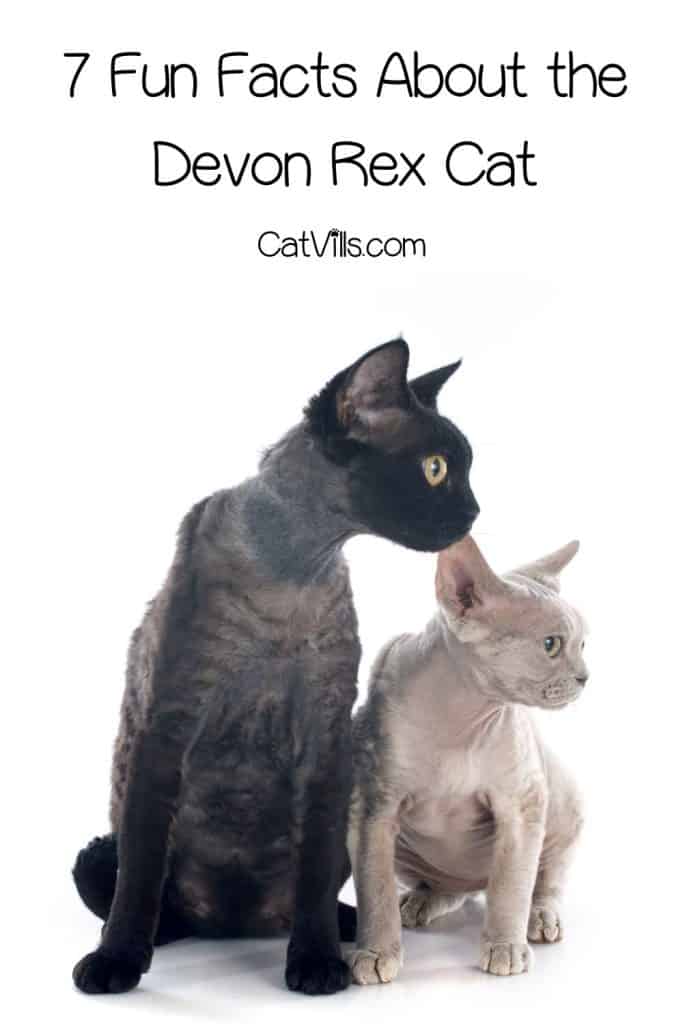Last Updated: 2 years ago
Curious about the Devon Rex cat breed?
Maybe you saw one in passing and thought, “I need to know more!”
Or perhaps you’re considering bringing one of these iconic breeds into your family.
Whatever the reason for your curiosity, I’m satisfying it below with these intriguing Devon Rex facts!
7 Amazing Devon Rex Facts
The Devon Rex is an iconic breed of cat! Distinct in appearance and personality, the breed is highly sought after by breeders and owners alike.
For this reason, the Devon Rex can fetch a hefty price. The medium-sized breed is also known for its excitable and playful personality.
Let’s learn all about where the Devon Rex came from, what they’re like as a breed, how healthy they are, and so much more.
1. A Fascinating History
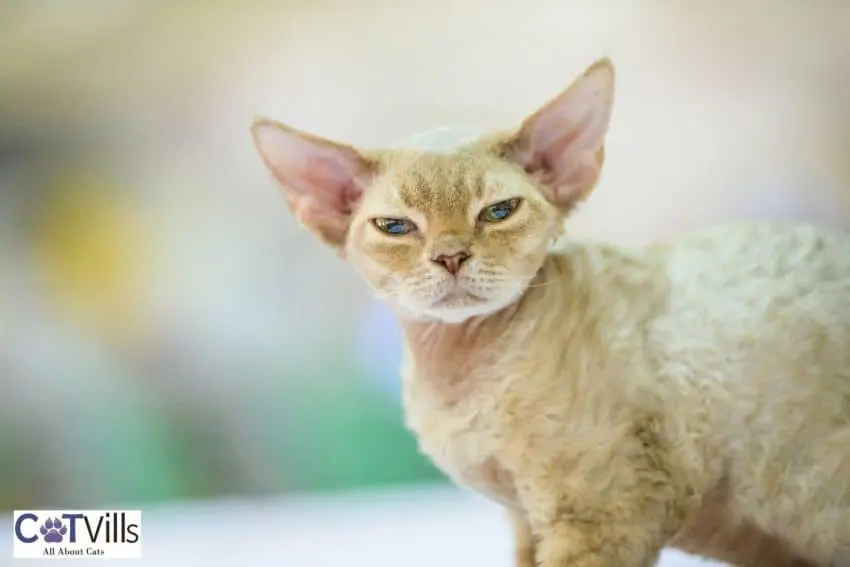
The unique Devon Rex cat enjoys an appropriately unique heritage.
Unfortunately, there is a fair bit of confusion surrounding the specifics of the breed’s origin, with some accounts more fanciful than others.
Mrs. Beryl Cox of Devon receives most of the credit. She took in the original male cat, which had a natural mutation.
The unique ‘rex’ mutation variant, to be precise. The cat remained untamed, but Mrs. Cox kept track of it all the same.
She came across a litter of kittens, the offspring of the unique male and a local female cat.
One of the Kittens had the same distinctive curly coat as its sire. From there, it was just a matter of rigorous line-breeding to produce the distinctive Devon Rex we know today.
Bonus Fact
The Devon Rex and the Cornwall Rex both have a unique mutation that causes their curly coats.
But, fascinatingly, the two mutations arose independently within close geographic proximity.
2. A Surprising Personality
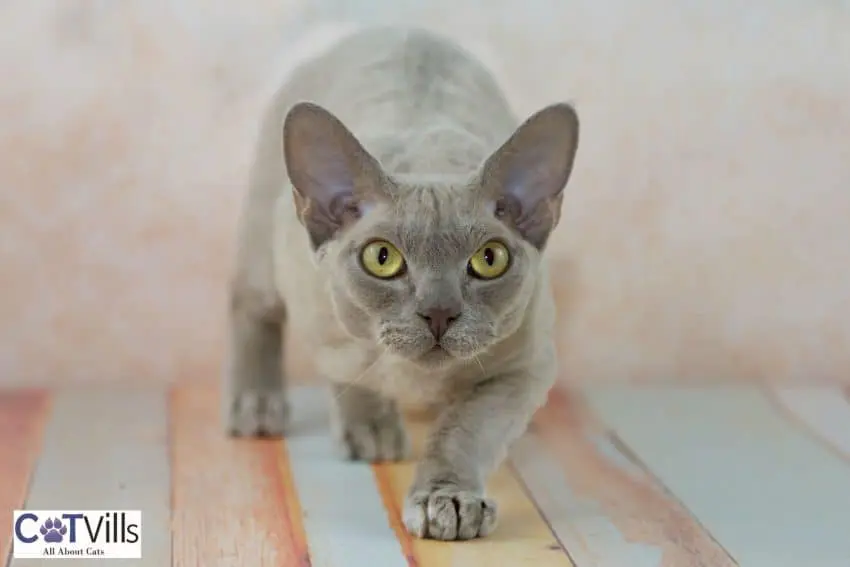
Devon is a playful cat who just loves to be silly at times. This breed certainly gives the impression that it is trying its very best to entertain.
As affectionate cats, they will also demand your time and affection. This makes the Devon Rex the ideal pet for cat lovers who seek a more affectionate pet that loves sharing time.
It is worth noting that a Devon may require extra care and patience. Being precocious is part of their lively personalities.
So much so that the breed has inherited the nickname monkey cats. Your Devon’s fervent play might see them swinging from the drapes or speed-climbing your furniture.
The quirky behavior does not stop there! The Devon Rex cat is considered one of the most dog-like breeds, too!
For example, they’re fond of playing fetch. According to some owners, they can even learn to walk on a leash.
You may want to invest in an elaborate play area for your Devon kitten beforehand. A multi-tier scratching post and a cat tree, along with plenty of toys, should help keep your kitten entertained and out of trouble.
While very affectionate, the Devon Rex is not a lap cat. They’re far too easily distracted, requiring tons of mental stimulation, and will quickly seek new play opportunities.
3. A Unique Looking Feline
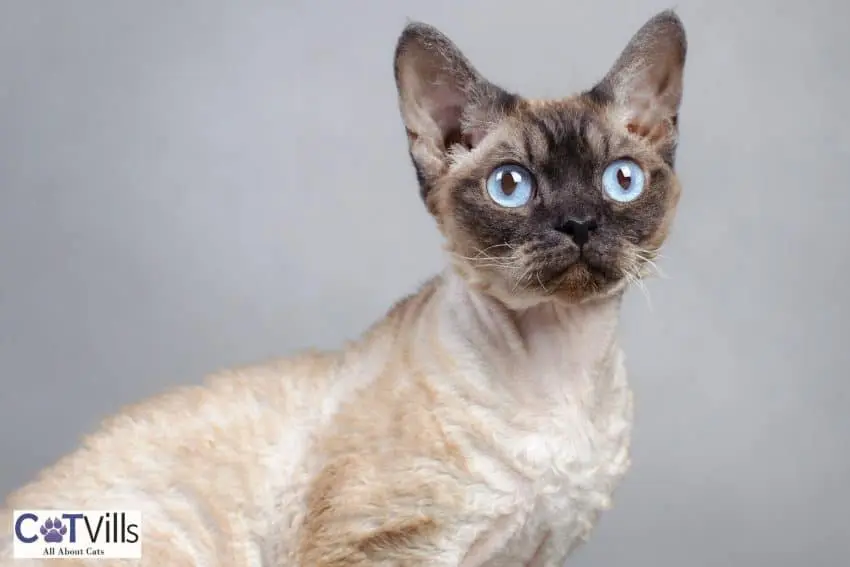
The Devon Rex is an altogether distinct-looking cat. Their sharp facial features have a pixie-like quality, with wide cheeks and a distinct dip in their profile.
Their chin is sharp and well-defined. The breed standard demands large eyes, as well as large, low-set ears.
The breed is most famous, though, for its soft coat. The Devon’s coat consists mainly of the down hairs of the undercoat.
The curly fur resembles the iconic Marcel wave, also seen in the Cornish Rex. Devon’s curly whiskers may occasionally snap off.
The medium-sized cats have a slender body with a sleek and defined silhouette. Small paws meet long, slender legs. The hind legs are longer than the forelegs.
Oh, and if you’re looking for a cat that won’t leave fur all over your clothes and couch, you’re in luck. The Devon Rex falls into the category of low-shedding breeds.
As for colors, Devons can have anything from solid-colored coats to tortoiseshell patterns.
Bonus Fact
The Devon Rex has very fragile fur. Lacking guard hairs, the delicate coat is so fragile that you should never attempt to brush or comb a Devon for fear of damaging its signature coat.
4. A Jolly Jumper
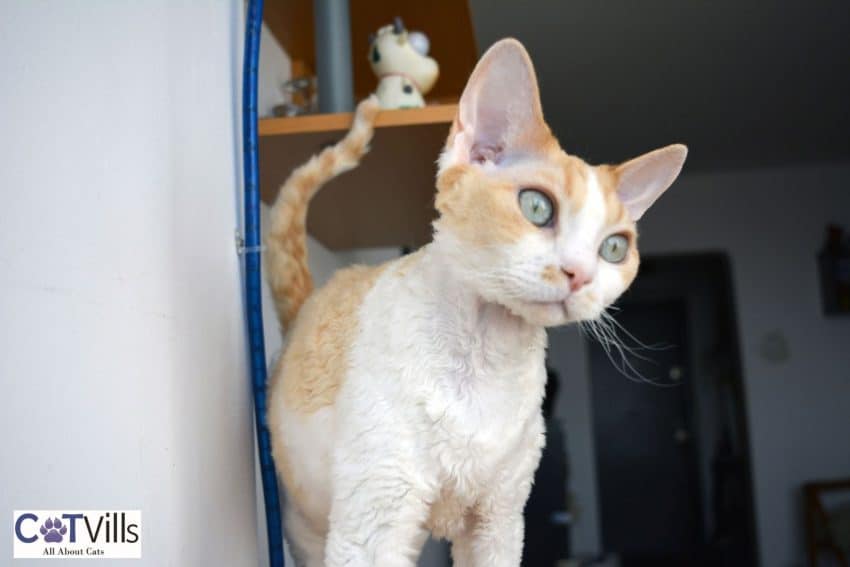
There exists a subcategory of mammals referred to as saltatory. These are animals that primarily jump or hop as a way of getting around.
Interestingly, the hind legs of such animals are always longer than the forelegs. That perhaps accounts for the longer hindlegs of the Devon Rex. It is a natural-born jumper.
A Devon will spend a lot of their time traversing different surfaces in your home. The energetic breed is undaunted by the height of your kitchen countertops or dining room table.
Jumping makes up an important part of their play, with Devon’s frequently mock-hunting things within jumping distance.
5. A (Mostly) Healthy Fur Ball
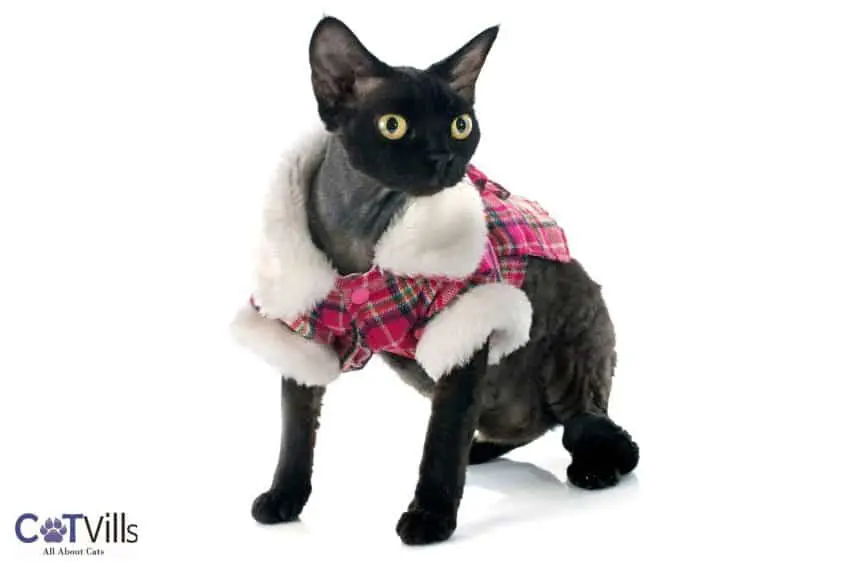
The Devon Rex is considered a healthy breed. On the contrary, their upbeat attitudes and inexhaustible energy speak to their good health.
That said, there are always health concerns, particularly when it comes to ‘purebred’ animals.
The Devon Rex is a relative newcomer to the scene. With the genetic line tracing back to recent history, genetic diversity can be a problem.
Genetic diversity is the measure of diversity in the DNA pool of a given population or species.
Because all Devon Rex’s are descendants of the kitten found by Mrs. Cox, the gene pool is somewhat homogenous.
Finding a reputable breeder
In recent years, professional breeders have worked wonders at improving diversity. But, unfortunately, some hereditary defects can still occur.
The best way to avoid such defects is by only purchasing Devon Rex kittens from reputable breeders.
It may seem unkind to reject a prospective pet based purely on the breeder’s reputation, but such breeders can’t stay in business without support.
In the long term, this will save countless cats from being born with life-threatening hereditary conditions.
Common hereditary conditions
Hypertrophic cardiomyopathy is a condition in which the heart muscle thickens. It is a very difficult condition to diagnose and may go unnoticed until the prognosis becomes poor.
Coagulopathy is a serious abnormality that causes blood to not clot normally.
Devon Rex’s are also prone to skin conditions. These mostly take the form of manageable rashes or crusty sores but can turn serious if left untreated.
Dental problems, conditions one often overlooks, quite possibly pose the most risk to the Devon Rex.
Teething terrors
There is a correlation between hair follicle growth and development and the healthy development of the dentition. Skin conditions that affect the coat may indicate that there is a problem with dental development.
Once severe dental problems set in, a cascade takes place. The health of every organ is eventually compromised, starting with the heart and liver.
As one organ is affected, the next starts taking damage. The Devon’s teeth can also form with too few roots. The jaw can be too small to accommodate the cat’s full set of teeth.
General concerns
There is never a certainty of perfect health. A cat of any breed can succumb to various ailments.
Cats are generally independent and even self-sufficient. Indeed, your cat could probably take better care of itself than a dog.
That said, there are some general red flags. These include feline immunodeficiency virus, diabetes, and heartworm.
6. A Clever Kitty
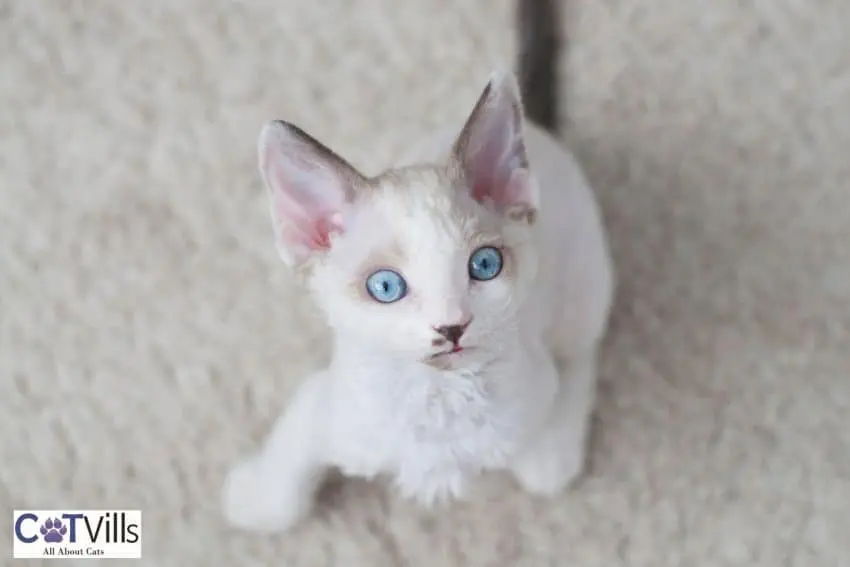
Devon Rex is a very intelligent breed of cat. Smart enough to learn tricks or participate in training and agility contests. Devons are eager to explore and love to play hunting.
The Devon Rex is so adept at the latter that you may find yourself accepting many gifts by way of the catch of the day.
It will incorporate its keen intelligence and incredible agility in its hunting, making it a deadly predator to most garden-dwelling critters.
While admirable in sheer skill, the Devon Rex’s hunting talents may permanently scare off any birds that have the good sense to vacate your premises before coming under your Devon’s sights.
Bonus Fact
Despite what one might think, the ‘rex’ mutation has nothing to do with an animal being rough and tumble.
Rather, the rare mutation causes some mammals, like dogs and cats, to develop a distinct curly undercoat.
7. A Closed-Quarters Companion
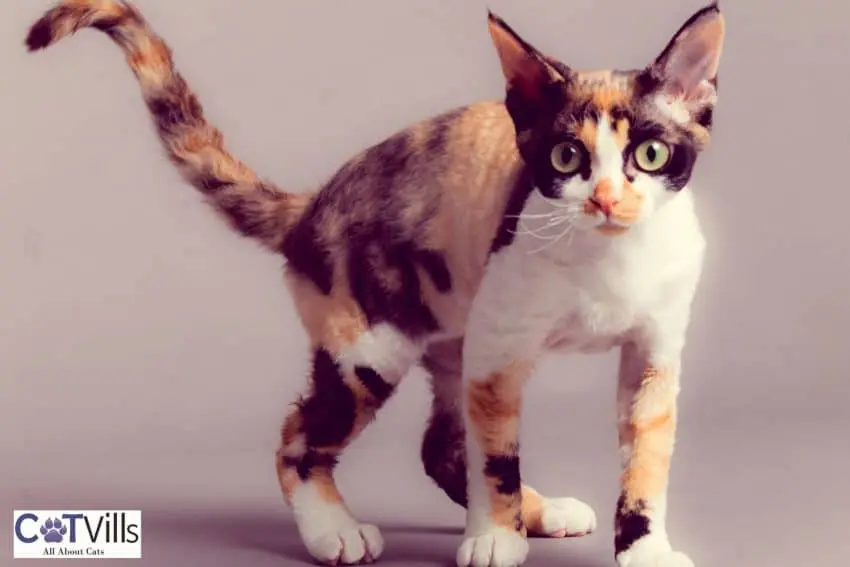
There may be a reprieve for its many potential victims yet. The Devon Rex might enjoy the outdoors, but it is ill-suited to direct sunlight.
Its thin, light coat offers very little protection from the sun’s harsh rays. It is best to keep your Devon indoors.
With enough playroom and plenty of things to play with, your little rex should be just fine.
Tall trees are an additional risk for these curious climbers. Its agility may see it up the tree, but coming back down may not be as simple.
That is another reason that ‘inside’ is the best place for your Devon Rex.
Bonus Fact
The Devon Rex’s coat changes in density with every season.
Summary
If you are keen on taking in a calm cat that will spend its days luxuriating about the living room, the Devon Rex is not the pet for you.
However, if you seek a vibrant, charismatic, and slightly mischievous companion, you are in for a treat. These cats adore their human families and make for a great family pet.
The Devon Rex will keep you busy, show you all the affection you could ask for, and occasionally give your drapes a good what for!
What do you love most about the Devon Rex? Let us know in the comments below!
Resources:
